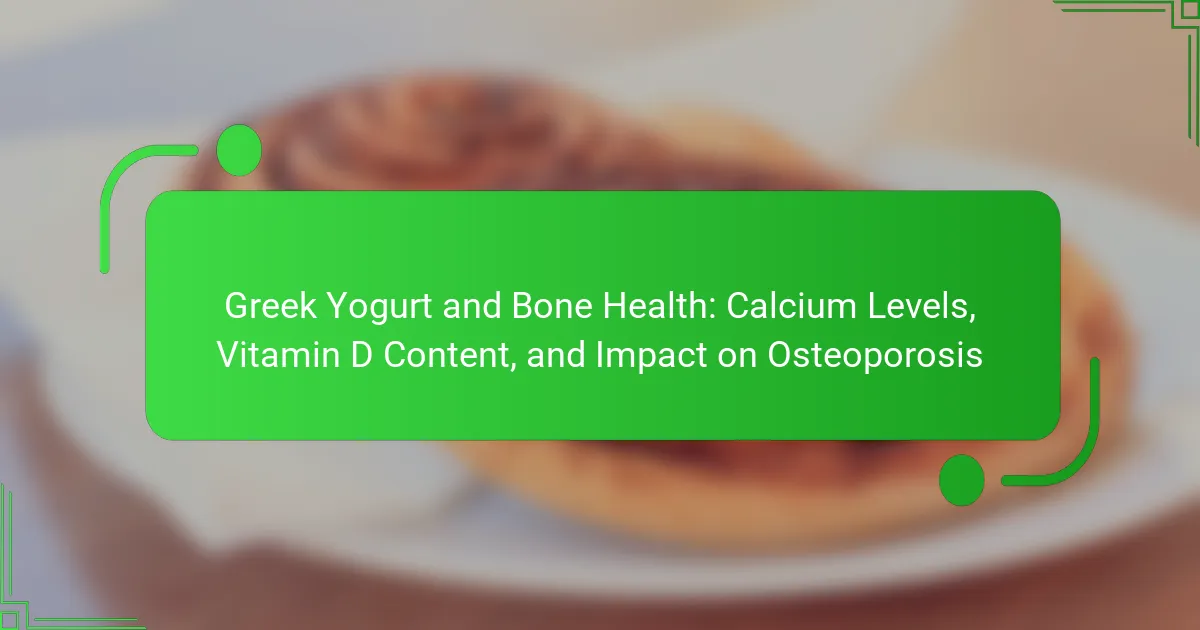Greek yogurt is a nutrient-rich food that significantly supports bone health, primarily due to its high calcium content, which is crucial for maintaining bone density and strength. A typical serving provides about 15-20% of the daily recommended calcium intake, helping to prevent osteoporosis. Additionally, Greek yogurt often contains vitamin D, enhancing calcium absorption and further reducing the risk of fractures, particularly in older adults. The protein content and fermentation process of Greek yogurt also contribute to muscle mass and nutrient bioavailability. To maximize bone health benefits, it is advisable to choose Greek yogurt varieties fortified with vitamin D and consume them regularly as part of a balanced diet.

What is the relationship between Greek yogurt and bone health?
Greek yogurt supports bone health due to its high calcium content. Calcium is essential for maintaining bone density and strength. A typical serving of Greek yogurt contains about 15% of the daily recommended calcium intake. This nutrient helps prevent osteoporosis, a condition characterized by weak bones. Additionally, Greek yogurt often contains vitamin D, which enhances calcium absorption. Studies indicate that adequate calcium and vitamin D intake can significantly reduce the risk of fractures in older adults. Therefore, incorporating Greek yogurt into the diet can contribute positively to bone health.
How does Greek yogurt contribute to calcium levels?
Greek yogurt is a significant source of calcium, which is essential for bone health. One serving of Greek yogurt can contain approximately 150 to 200 mg of calcium. This contributes to the daily recommended intake of calcium, which is about 1000 mg for adults. The calcium in Greek yogurt helps maintain bone density and strength. Additionally, the fermentation process enhances calcium absorption in the body. Studies indicate that regular consumption of dairy products, including Greek yogurt, is linked to improved bone health. Thus, Greek yogurt effectively supports calcium levels and overall bone health.
What are the calcium content levels in Greek yogurt?
Greek yogurt typically contains about 100 to 150 mg of calcium per 100 grams. This level can vary based on the brand and whether it is low-fat or full-fat. Greek yogurt is a significant source of calcium, which is essential for bone health. The calcium content supports the body’s needs for maintaining bone density and preventing osteoporosis. Studies indicate that regular consumption of calcium-rich foods like Greek yogurt can contribute positively to bone strength.
How does the calcium in Greek yogurt compare to other dairy products?
Greek yogurt contains a higher calcium content compared to many other dairy products. A typical serving of Greek yogurt provides approximately 200 to 300 mg of calcium. In contrast, regular yogurt offers around 300 to 400 mg per serving. However, the straining process in Greek yogurt concentrates the nutrients, making it a more calcium-rich option per ounce. Additionally, cheese varieties like cheddar can contain up to 200 mg of calcium per ounce. Milk, depending on the fat content, typically has about 300 mg of calcium per cup. Therefore, while Greek yogurt may not always surpass all dairy products in calcium content, its unique processing enhances its nutritional profile, making it a significant source of calcium in the diet.
What role does vitamin D play in bone health?
Vitamin D is essential for bone health as it aids in calcium absorption. Calcium is a critical mineral for maintaining bone density and strength. Without sufficient vitamin D, the body cannot absorb enough calcium from food. This can lead to weakened bones and increased risk of fractures. Studies show that adequate vitamin D levels reduce the risk of osteoporosis. The National Institutes of Health recommends a daily intake of 600 to 800 IU for adults. This intake supports optimal bone mineralization and overall skeletal health.
How does Greek yogurt provide vitamin D?
Greek yogurt provides vitamin D primarily through fortification. Many brands add vitamin D to their yogurt during production. This process enhances the nutritional profile of the yogurt. Fortified Greek yogurt can contain about 20% of the daily recommended intake of vitamin D per serving. Vitamin D is crucial for calcium absorption, promoting bone health. The presence of vitamin D in Greek yogurt supports overall skeletal strength. Research indicates that vitamin D deficiency can lead to weakened bones and osteoporosis. Thus, consuming fortified Greek yogurt contributes positively to bone health.
What is the significance of vitamin D for calcium absorption?
Vitamin D is essential for calcium absorption in the intestines. It enhances the efficiency of calcium uptake from dietary sources. Without adequate vitamin D, the body cannot absorb enough calcium, leading to potential deficiencies. This deficiency can weaken bones and increase the risk of osteoporosis. Research indicates that vitamin D deficiency can reduce calcium absorption by up to 80%. Therefore, maintaining sufficient vitamin D levels is crucial for optimal calcium metabolism and bone health.
What is osteoporosis and how is it related to diet?
Osteoporosis is a medical condition characterized by decreased bone density and increased fracture risk. It occurs when the body loses too much bone or makes too little bone. Diet plays a crucial role in bone health, particularly calcium and vitamin D intake. Calcium is essential for bone formation and maintenance. Vitamin D helps the body absorb calcium effectively. A diet low in these nutrients can contribute to the development of osteoporosis. Studies indicate that adequate intake of calcium and vitamin D can reduce the risk of osteoporosis. For instance, the National Osteoporosis Foundation recommends consuming sufficient calcium and vitamin D to support bone health.
How can Greek yogurt help in preventing osteoporosis?
Greek yogurt can help in preventing osteoporosis due to its high calcium content. Calcium is essential for maintaining bone density and strength. One serving of Greek yogurt typically contains about 200-300 mg of calcium. This contributes significantly to the recommended daily intake of calcium for adults, which is around 1000 mg. Additionally, Greek yogurt often contains vitamin D, which aids in calcium absorption. Studies indicate that adequate calcium and vitamin D intake reduces the risk of osteoporosis. Therefore, incorporating Greek yogurt into the diet can support bone health effectively.
What other dietary factors influence osteoporosis risk?
Dietary factors that influence osteoporosis risk include protein intake, magnesium, and vitamin K. Adequate protein supports bone health by promoting bone density. Magnesium is essential for bone formation and helps regulate calcium levels. Vitamin K plays a crucial role in bone metabolism and helps bind calcium to the bone matrix. A diet low in these nutrients may increase osteoporosis risk. Studies show that higher protein intake correlates with greater bone mineral density. Additionally, insufficient magnesium and vitamin K can lead to weakened bones. These dietary components are vital for maintaining bone strength and preventing osteoporosis.
How can incorporating Greek yogurt into your diet benefit bone health?
Incorporating Greek yogurt into your diet can significantly benefit bone health. Greek yogurt is rich in calcium, which is essential for maintaining strong bones. A typical serving contains about 200-300 mg of calcium. Calcium helps in building bone density and reducing the risk of osteoporosis.
Additionally, Greek yogurt often contains vitamin D, which aids in calcium absorption. This vitamin is crucial for bone health, as it enhances the body’s ability to utilize calcium effectively. Some brands fortify their yogurt with extra vitamin D, providing up to 25% of the daily recommended intake.
Moreover, the probiotics found in Greek yogurt can support overall health, including gut health, which is linked to better nutrient absorption. Improved nutrient absorption means that your body can utilize calcium and vitamin D more effectively, further promoting bone strength.
Research indicates that diets high in dairy, including yogurt, are associated with higher bone mineral density. This correlation highlights the importance of including Greek yogurt as a dietary staple for optimal bone health.
What are some practical ways to include Greek yogurt in meals?
Greek yogurt can be included in meals in various practical ways. It can serve as a base for smoothies, adding creaminess and protein. Incorporating it into salad dressings enhances flavor and nutrition. Using Greek yogurt as a topping for baked potatoes or chili adds a tangy twist. It can be mixed with fruits and nuts for a healthy breakfast or snack. Greek yogurt can also replace sour cream in recipes, providing a healthier alternative. Adding it to sauces or soups can improve texture and nutritional value. Finally, it can be used in baking to add moisture and protein to muffins or pancakes.

What are the unique attributes of Greek yogurt that affect bone health?
Greek yogurt has several unique attributes that positively affect bone health. It contains high levels of calcium, essential for bone density and strength. A typical serving of Greek yogurt can provide approximately 20% of the daily recommended calcium intake. Additionally, Greek yogurt is rich in protein, which supports muscle mass and bone integrity. The fermentation process increases the bioavailability of nutrients, making them easier for the body to absorb. Greek yogurt often contains probiotics, which may enhance gut health and nutrient absorption. Some varieties are fortified with vitamin D, further supporting calcium absorption and bone health. These attributes collectively contribute to reducing the risk of osteoporosis and improving overall bone health.
What makes Greek yogurt different from regular yogurt?
Greek yogurt differs from regular yogurt primarily due to its straining process. This process removes excess whey, resulting in a thicker texture. Greek yogurt typically contains more protein than regular yogurt, often around 10 grams per serving compared to 5 grams in regular yogurt. Additionally, Greek yogurt generally has lower sugar content. The straining process also leads to a creamier taste and higher fat content in some varieties. Nutritionally, Greek yogurt provides more calcium, essential for bone health. The differences in texture, protein, and nutritional content make Greek yogurt a distinct option for consumers.
How does the straining process affect nutrient levels in Greek yogurt?
The straining process significantly concentrates the nutrient levels in Greek yogurt. This method removes excess whey, resulting in a thicker product. As a result, Greek yogurt typically contains higher protein levels compared to regular yogurt. Protein content can increase to around 10 grams per 100 grams of Greek yogurt. Additionally, the straining process enhances the concentration of calcium, which is vital for bone health. Studies indicate that Greek yogurt can provide approximately 110 mg of calcium per 100 grams. However, some water-soluble vitamins, like vitamin B12, may be reduced during straining. This reduction occurs as some vitamins are lost with the whey. Overall, straining improves protein and calcium levels while potentially decreasing certain vitamins.
What are the health benefits specific to Greek yogurt consumption?
Greek yogurt provides several health benefits, particularly for bone health. It is rich in calcium, which is essential for maintaining strong bones. One serving typically contains about 150-200 mg of calcium. Greek yogurt also contains probiotics, which can enhance gut health and improve nutrient absorption. Additionally, it is high in protein, with around 10-20 grams per serving, supporting muscle mass and overall health. The presence of vitamin D in some varieties aids in calcium absorption, further promoting bone strength. Studies show that regular consumption of dairy products like Greek yogurt is linked to a lower risk of osteoporosis.
What types of Greek yogurt are available and how do they differ?
Greek yogurt is available in several types, including plain, flavored, low-fat, and non-fat varieties. Plain Greek yogurt is unsweetened and contains no added flavors. Flavored Greek yogurt is sweetened and often has fruit or other flavorings added. Low-fat Greek yogurt contains reduced fat content compared to regular versions. Non-fat Greek yogurt has no fat and is often lower in calories. Each type differs in taste, texture, and nutritional content. For instance, plain yogurt is higher in protein and lower in sugar than flavored options. Low-fat and non-fat varieties have less fat but may have added stabilizers. These differences cater to varying dietary preferences and health goals.
What should consumers look for when choosing Greek yogurt for bone health?
Consumers should look for Greek yogurt that is high in calcium and fortified with vitamin D for optimal bone health. Calcium is essential for maintaining bone density and strength. A typical serving of Greek yogurt contains approximately 150-200 mg of calcium. Fortification with vitamin D enhances calcium absorption. This combination can significantly reduce the risk of osteoporosis, particularly in older adults. Consumers should also check for live active cultures, which can support overall digestive health. Choosing low-fat or non-fat options can help manage calorie intake while still providing these nutrients.

How can Greek yogurt consumption be optimized for maximum bone health benefits?
To optimize Greek yogurt consumption for maximum bone health benefits, choose varieties high in calcium and vitamin D. Greek yogurt typically contains 150-200 mg of calcium per serving. Select brands fortified with vitamin D, which enhances calcium absorption. Aim for two servings daily to meet recommended calcium intake. Incorporate Greek yogurt into meals, such as smoothies or parfaits, for better nutrient absorption. Pair it with foods rich in magnesium and phosphorus for synergistic effects. Research indicates that adequate calcium and vitamin D can reduce osteoporosis risk. Studies show that increased dairy intake is linked to higher bone mineral density.
What are the recommended serving sizes for Greek yogurt?
The recommended serving size for Greek yogurt is typically 150 to 200 grams. This amount provides a good balance of protein and nutrients. A standard serving often contains around 15 to 20 grams of protein. Consuming this serving size can contribute to daily calcium intake, essential for bone health. Research indicates that adequate protein and calcium support bone density. The American Heart Association recommends low-fat or non-fat options for health benefits.
How often should Greek yogurt be consumed for optimal bone health?
Greek yogurt should be consumed daily for optimal bone health. Regular intake supports calcium and protein needs, essential for bone density. A serving of Greek yogurt typically contains around 15-20 grams of protein and 200-300 mg of calcium. Consuming it daily can help meet the recommended dietary allowance of calcium, which is 1,000 mg for most adults. Studies show that adequate calcium intake reduces the risk of osteoporosis. Additionally, Greek yogurt’s vitamin D content aids calcium absorption. Therefore, incorporating Greek yogurt into your daily diet is beneficial for maintaining strong bones.
What are some common misconceptions about Greek yogurt and bone health?
Greek yogurt is often misunderstood regarding its benefits for bone health. A common misconception is that all Greek yogurt contains high levels of calcium. While many brands do offer significant calcium, some varieties may have lower levels. Additionally, some people believe that Greek yogurt alone can prevent osteoporosis. In reality, a balanced diet and lifestyle are essential for bone health. Another misconception is that Greek yogurt is a poor source of vitamin D. Some products are fortified with vitamin D, enhancing their benefits for bone strength. Research indicates that adequate intake of both calcium and vitamin D is crucial for maintaining bone density.
Why do some people believe Greek yogurt is not beneficial for bone health?
Some people believe Greek yogurt is not beneficial for bone health due to its lower calcium content compared to other dairy products. While Greek yogurt is a good source of protein, it typically contains less calcium than regular yogurt. This perception may arise from the emphasis on calcium as a critical nutrient for bone health. Additionally, some individuals may not consider Greek yogurt as a sufficient source of vitamin D, which is also important for bone health. Research indicates that adequate calcium and vitamin D intake is essential for maintaining bone density. Therefore, the concerns about Greek yogurt’s contribution to bone health stem from its nutritional profile compared to other dairy options.
What tips can help individuals incorporate Greek yogurt into their diet effectively?
Incorporating Greek yogurt into the diet can be achieved through various practical tips. First, use Greek yogurt as a base for smoothies. This adds creaminess and boosts protein content. Second, substitute Greek yogurt for sour cream in recipes. This reduces fat while enhancing flavor. Third, mix Greek yogurt with fruits and nuts for a nutritious breakfast. This combination provides essential vitamins and minerals. Fourth, add Greek yogurt to salad dressings for a healthier option. This enhances taste and adds creaminess. Fifth, use Greek yogurt in baking as a replacement for oil or butter. This reduces calories and adds moisture. Finally, enjoy Greek yogurt as a snack with honey or granola. This creates a satisfying treat that is both healthy and delicious.
Greek yogurt is a dairy product that plays a significant role in supporting bone health due to its high calcium and vitamin D content. A typical serving provides 150-300 mg of calcium, essential for maintaining bone density and preventing osteoporosis. The article will explore how Greek yogurt contributes to calcium levels, its comparison with other dairy products, and the importance of vitamin D for calcium absorption. Additionally, it will address dietary factors influencing osteoporosis risk and practical ways to incorporate Greek yogurt into daily meals for optimal bone health benefits.


